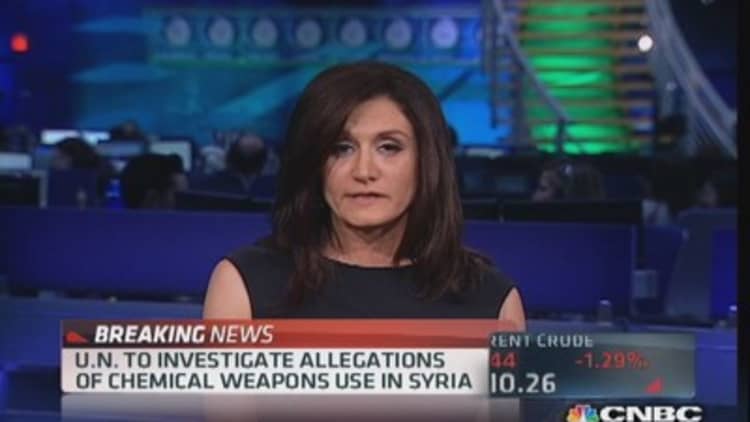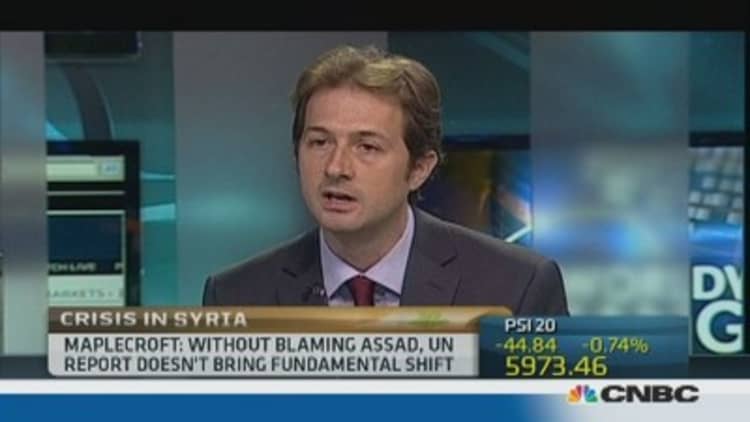The eyes of the world will be fixed on a six-block patch of New York City this week as dignitaries and envoys gather at United Nations Headquarters for one of the most pivotal General Assembly meetings in recent history.
Leaders from nearly 200 member states from Afghanistan to Zimbabwe are slated to convene Monday for a high-stakes conference fraught with equal parts promise and peril. The crisis in Syria casts a large shadow over the plenary, as the U.S. and Russia press for a diplomatic disarmament deal even as Washington and Moscow remain deeply divided over how to make sure President Bashar Assad keeps his end of the bargain.
And yet as the General Assembly gets underway, the debate over Syria may not get nearly as much attention as a single handshake in a hallway or nod across a conference table: Analysts and observers will likely watch closely for any encounter between President Barack Obama and Iranian President Hassan Rouhani — no matter how fleeting — after the recently-elected moderate leader's friendly overtures to the U.S.
(Read more: Oil's focus returnsto Syria, Iran at United Nations)

But Syria and Iran will be just two of the key items on the agenda at the 68th General Assembly. A panoply of players from nations large and small are likely to grapple for attention and influence amid this watershed year for the United Nations, experts say.
"The stakes are very high," said P.J. Crowley, a former assistant secretary of state and National Security Council adviser.
And those stakes raise a number of burning questions, ranging from the impact a warm exchange will have on rapprochement between the U.S. and Iran to whether the General Assembly will offer clues about the future of Israel-Palestine peace talks.
Will Obama and Rouhani meet face-to-face?
In an interview with NBC News' Ann Curry on Sept. 18, Rouhani said Iran would never "seek weapons of mass destruction, including nuclear weapons" and that he had "full power and complete authority" — including crucial backing from Supreme Leader Ayotallah Khamenei — to make a nuclear disarmament deal with the U.S.
Those statements — plus similar overtures in the pages of the Washington Post and on his official Twitter feed — have many observers wondering if Rouhani is readying for a face-to-face talk with Obama when he arrives in New York.
"It's possible, but it has always been possible," White House spokesman Jay Carney said. "The extended hand has been there from the moment the president was sworn in."
Analysts and observers, however, say Obama and Rouhani are highly unlikely to sit down for a formal conversation. They're more likely to exchange pleasantries in passing.
"There might be a, 'Hi, how are you?' or a handshake, or an ice breaker that sets the stage for another meeting," Crowley said.
And yet even a handshake could be "huge" news, Crowley added. It would mark the first time in more than 30 years that the U.S. leader acknowledges the Iranian president face-to-face — so "anything that happens will be consequential," he said.
"We haven't had presidential-level interaction since Jimmy Carter and the Shah in 1977," said Hussein Banai, a scholar and co-author of the book "Becoming Enemies: U.S.-Iran Relations and the Iran-Iraq War."
(Read more: )

"Even something as seemingly small as a handshake would mean that a taboo has been broken," Banai said, adding that it could be the beginning of plans for long-awaited — but incredibly complicated — talks about Iran's right to enrich uranium and maintain weapons stockpiles.
What will Rouhani say in his first U.N. speech?
In keeping with tradition, the United States and Iran are scheduled to speak fairly early in the conference. Obama will address congregated countries Tuesday morning — and Rouhani will take the podium just hours later.
Although it remains unclear what, exactly, Rouhani will say in his speech, he is likely to strike a balanced, conciliatory tone to distinguish himself from his predecessor: the fiery, vitriolic Mahmoud Ahmadinejad, who used his annual appearances in New York as opportunities to condemn Israel and harangue America.
Rouhani will likely strive to show he "stands in stark contrast to Ahmadinejad," said Joel Rubin, a former State Department official who now works at the nonproliferation organization Ploughshares.
He may also try to turn attention away from Iran's alleged ambitions to build a bomb and focus, instead, on broader "themes ... about Iran's rightful place in the world, which will shore up Rouhani's credibility at home," Rubin added.
And according to Banai: "It's a very pivotal moment for him. He wants to put a positive face on this trip so everyone looks on Rouhani as a guy willing to make important concessions and engage the U.S."
Will Obama and Putin come to blows over Syria?
Although it is unclear if the Security Council while meet amid the General Assembly, there may be some tense discussions surrounding the U.S.-Russia deal ordering chemical weapons disarmament in Syria that averted the threat of Western military strikes.
Obama administration officials are expected to keep pushing for a Security Council resolution making the deal legally binding in a way that is verifiable and enforceable. Obama has warned that the U.S. is still ready to launch air strikes at key Assad regime targets — even without U.N. backing — if Assad goes back on the deal.
(Read more: )
Russia, one of Syria's chief political allies and bank-rollers, remains steadfastly opposed to any military action against Syria as punishment for the alleged used of chemical weapons against its citizens Aug. 21, which killed some 1,426 people, including hundreds of women and children.
"The Russian delegation's actions will be very important to note," Banai said. "And not just with Syria and Iran. They are riding a wave of renewed diplomatic prestige."
Although the U.S. position on the crisis on Syria has thus far been relatively fluid, top officials have repeatedly stressed that coming to an agreement is paramount — a message that will likely carry throughout the General Assembly.
"Time is short. Let's no spend time debating what we already know," Secretary of State John Kerry told reporters at a State Department briefing Thursday.
Assad, for his part, said Syria "should not be concerned by" a draft resolution sent to the Security Council by the U.S., the United Kingdom and France.
In an interview with China's state broadcaster CCTV, Assad said: "By submitting the draft to the U.N. Security Council, or by urging the U.S. and Russia to agree on a deal, the U.S., France, and Britain are just trying to make themselves winners in a war against a Syria which is their imaginary enemy."
Will Israel and Palestine show any sign of progress on peace talks?
Amid intensely chaotic violence in Syria and recent scrutiny on Iran, the U.S.-brokered direct talks between the Israelis and Palestinians have been somewhat overshadowed, Rubin said.
Peace talks relaunched this summer after months of lobbying by Kerry, and while it remains unlikely that the two parties will manage to settle their age-old hostilities, the Obama administration has nonetheless kept the conversations afloat.
"The administration has gotten the Israelis and Palestinians into a negotiating process that amazingly hasn't collapsed," Rubin said.
Analysts and observers are likely to read the tea leaves wherever and whenever they can for any sign of progress.
Rubin wondered: "Will the Israelis and Palestinians meet at the U.N.? Will they have a trilateral meeting with the White House?"
Palestinian leaders have in recent years taken their case to the U.N., where there is broad and vocal support for their bid for statehood. And while the Obama administration supports Palestinian statehood, it has said that designation can only be reached through direct talks with the Israelis.
Sudan's president has been indicted for war crimes. Will he show up?
President Omar Hassan al-Bashir, wanted for years by the International Criminal Court on charges of genocide and other crimes in the bloody Darfur conflict, has triggered a tempest of anger from human rights groups with his announced plan to attend the General Assembly.
U.S. officials have said that al-Bashir had submitted a request for a visa. As the U.N.'s host country, the U.S. is obligated to extend visas to foreign leaders who wish to participate in the plenary — no matter their global M.O. or any controversial matters hanging over their heads.
Although the U.S., which is not party to the ICC, is not required to turn al-Bashir away, officials have made it clear they do not want him to show up in Manhattan.
"Such a trip would be deplorable, cynical and hugely inappropriate," said Samantha Power, the U.S. ambassador to the United Nations.
Marie Harf, the State Department deputy spokeswoman, dodged a question about whether the embattled leader could be detained if he comes to the U.S.
"There are a variety of considerations in play with respect to President Bashir's visa request, including the outstanding warrant for his arrest," Harf said Friday. "But we're not going to sort through these considerations publicly. We're going to continue to do so privately and deliberately."
For Rubin, the question remains: "Will we arrest him at JFK?"
—By Daniel Arkin of NBC News. The Associated Press contributed to this report.

